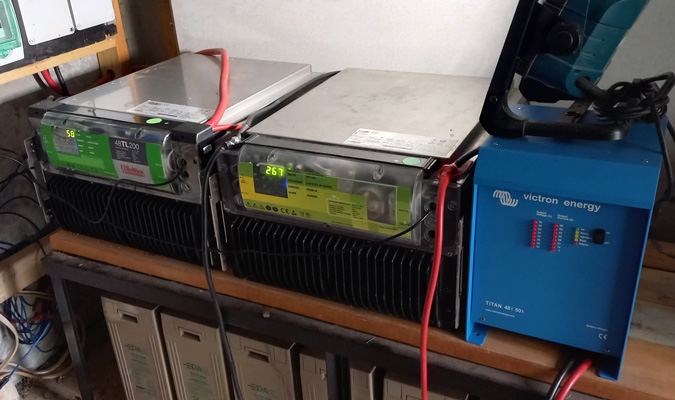Sodium-nickel chloride batteries are a type of high-temperature rechargeable battery that uses a sodium-nickel chloride chemistry. These batteries operate at elevated temperatures, typically around 300-350°C (572-662°F). They’re also known as Na-NiCl2 batteries or SoNick batteries.
In the solar industry, sodium-nickel chloride batteries have been explored for utility-scale energy storage applications. They can complement solar power generation by storing excess energy during peak sunlight hours for later use when solar production is low or during periods of high energy demand.
How Na-NiCl2 Battery Works
Sodium-nickel chloride (Na-NiCl2) battery consists of three main components:
- Negative electrode (anode), which is made of molten sodium
- Positive electrode (cathode), which is based on nickel chloride;
- A special type of electrolyte made of solid ceramic beta-alumina.
The electrolyte allows sodium ions to move between the anode and cathode while preventing the migration of electrons.
Charging
During charging, an external electrical current is applied. This current moves sodium ions through the electrolyte from the negative electrode (anode) to the positive electrode (cathode).
At the same time, electrons are released and flow through the external circuit. This process effectively stores electrical energy within the battery.
Discharging
When the battery is supplying power, the process reverses. Sodium ions move back to the anode through the electrolyte.
This movement causes electrons to be released at the anode. Thus, generating an electrical current to power devices or systems.

Sodium Nickel Chloride Battery Advantages
SoNick batteries offer several key benefits.
- High Energy Density — Offer relatively high energy density, making them suitable for storing large amounts of energy.
- Long Cycle Life — Can withstand a large number of charge and discharge cycles, contributing to their longevity.
- Good Thermal Stability — Operate at high temperatures, which can enhance thermal stability and reduce safety concerns associated with some other battery chemistries.
Sodium Nickel Chloride Battery Disadvantages
Despite their advantages, these batteries also present certain drawbacks that limit their use in some scenarios.
- High Operating Temperatures — Maintaining high operating temperatures requires additional energy and specialised thermal management systems.
- Cost and Complexity — The high-temperature operation and materials used can lead to higher production costs and technical complexity.
Utilising Na-NiCl2 batteries for Renewable Energy Storage
Research and development efforts are ongoing to improve efficiency and reduce costs. Addressing technical challenges is also a key part of these efforts.
These improvements are intended to make these batteries more viable for a wider range of renewable energy storage applications.
Sodium-nickel chloride batteries are notable for their high energy storage capacity. They can handle frequent charge and discharge cycles well. This makes them suitable for large-scale energy storage systems, especially those connected to solar farms.
However, there are some limitations. SoNick batteries operate at high temperatures, which leads to challenges in thermal management. This issue may limit their use in smaller solar installations or in residential settings.
Addressing these challenges is essential for expanding the range of solar battery types suitable for various scales of solar energy applications.
Reviewed by

Tom Ransome
Co-Founder of Renewables4U and renewable energy advocate. He has experience and extensive knowledge in the field, including a groundbreaking academic thesis and a significant role in Australia's solar industry since 2016. With a BA in Business Studies, focusing on finance and management, Tom merges business acumen with technical expertise to deliver economically and eco-friendly projects.

